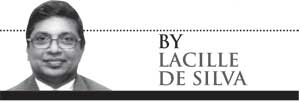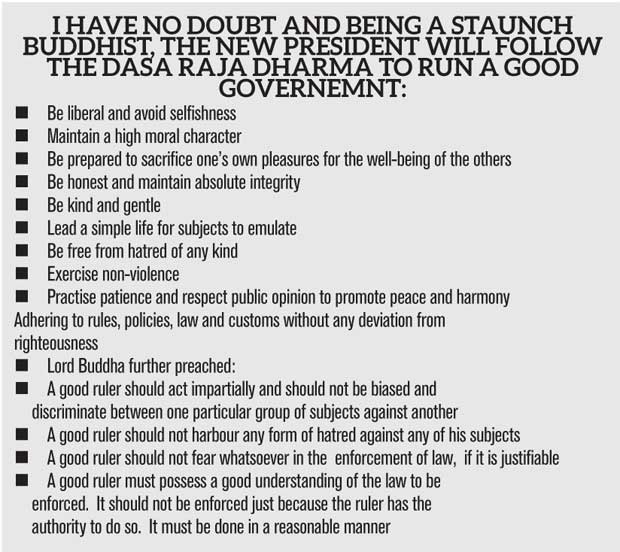Reply To:
Name - Reply Comment
 he effectiveness and efficiency of a country’s public service is vital to the success of development activities, sound financial management, administrative policy, efficient and fair collection of taxes, and transparent operations.
he effectiveness and efficiency of a country’s public service is vital to the success of development activities, sound financial management, administrative policy, efficient and fair collection of taxes, and transparent operations.
It is necessary, therefore, in the context of the Sri Lankan public service, to understand what needs improvement and what is missing in order to contribute to the delivery of public services to meet the expectations of the general public satisfactorily.
The 1978 Constitution brought revolutionary changes to the system, having shifted the executive power from a Cabinet of Ministers, which was a part of the Parliament. The all-powerful Executive President, who is also the Head of State, the head of the Cabinet of Ministers and the Commander-in- Chief of the Armed Forces is elected independently and not accountable to the supreme legislature. There is considerable support of the masses at present that we should revert to the old Parliamentary system and the present government has been elected by the  masses with a mandate for the purpose.
masses with a mandate for the purpose.
At the time we became an independent state, the then Ceylon was considered a relatively prosperous country by Asian standards. For example, in the mid 50s, it was on par with Malaysia with a per capita income of $120. However, over the next four decades, Sri Lanka shared with its South Asian neighbours the basic economic malaise of comparatively slow economic growth. That coupled with a rapid growth of population, which has increased more than 3 times, held back per capita income growth. At present, the country is at the bottom of the World Bank’s lower-middle-income countries. Successive governments could not take the country forward. We did not have leaders with a vision similar to Lee Kuwan Yew and Mahathir Mohamed.
Sri Lanka always stood out among the developing countries for its strong commitment to Parliamentary democracy and we could be proud that we elected a legislature exercising universal franchise as far back as in 1931. Since 1977, after liberalization of the economy, it has been strongly backed by donors with generous assistance and has attracted substantial foreign investments until political instability and the beginning of the war discouraged the investors after the mid 1980s.
The war had been misused by everybody for their own narrow ends, thereby undermining good governance. It became a costly and a complex business. Corruption slowly crept in and the politicians, military officials, public officials and the businessmen have been working hand in glove, all throughout. This has eventually established a group of people who have become newly rich. The all-powerful newly rich have caused immense damage to the culture, society and the social fabrique.
The protracted war needed a steady flow of money, material, human resources etc. on a sustained basis. The sad part of the story is that having put an end to the war, the former government neglected the masses and planned for early elections two years in advance. In my view, the then government failed to understand the damage caused by their own party men utterly corrupt, highly uncivilized, who abused power, and misused positions and authority - whether big or small, in a political culture where the leaders turned a blind eye and permitted anything and everything, including tying people to trees, corruption, fraud, sexual abuse on foreigners, drugs, ethanol etc. etc.

In order to cover up their shady deals etc, one-page advertisements were published in the dailies again spending colossal amounts of public money to boost the image of the President and the former Economic Development Minister. This was raised in Parliament by the JVP, which was somehow suppressed. This is why I have maintained that almost everybody was responsible for the defeat of the former President.
MR no doubt, had the ability and the charisma to win the hearts of the masses. He did not cleverly rule the country, and hence, there was no law and order nor discipline. He did not realize those shortcomings could boomerang at him. A group of people thoroughly inexperienced and incompetent and lacking knowledge in the state craft closer to him did the damage. You could escape having busted up billions of the public’s money; namely, Mihin Lanka, and even after assaulting a senior diplomat; it was totally politicized, utterly corrupt and fraudulent. Everybody hated the way the politicians moved about and waited patiently to use the ballot and used it cleverly.
It was unfortunate that a great Statesman in the making was destroyed. It is, therefore, imperative that the newly elected President should learn a lesson from his predecessor. I am extremely happy that the new President emphasized the need to work in harmony in order to ensure the fulfillment of aspirations of the people through a committed, sincere and corruption-free environment.
The President stressed the need to have a political and administrative culture that would contribute effectively for the removal of twin enemies - Poverty and corruption - from the country. The President while quoting from the Dhammapada added that good governance in keeping with the Dhamma would help deliver the benefits to the people and the country, which will ensure the dawn of a new era.
I must quote from what appears in Anguttara Nikaya what Buddha preached: “When the ruler of the country is just and good, the ministers become just and good, when the ministers become just and good, the higher officials become just and good, when the higher officials become just and good, the rank and file become just and good, when the rank and file become just and good, the people become just and good”. It is, therefore, the ruler who has to set the example. The new government should not make the same mistake and pamper the politicians. We need good educated politicians to be elected, who will do justice to the masses and not to resort to the mean levels we experienced during the last few years. Sri Lanka being a multi-ethnic and multi-religious country, I have no doubt the newly-elected President will lay the foundation for all communities to live happily without suspicion and misunderstanding, if the teachings of the Buddha are applied in day-to-day governance.
The writer is the former Director (Administration)
Parliament of Sri Lanka